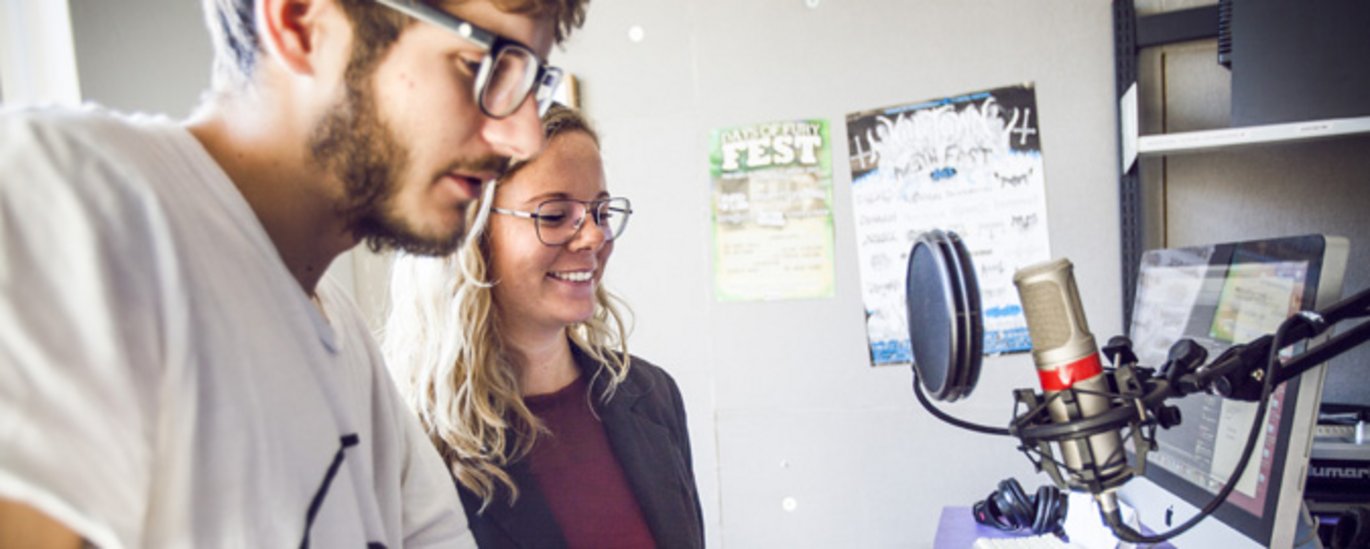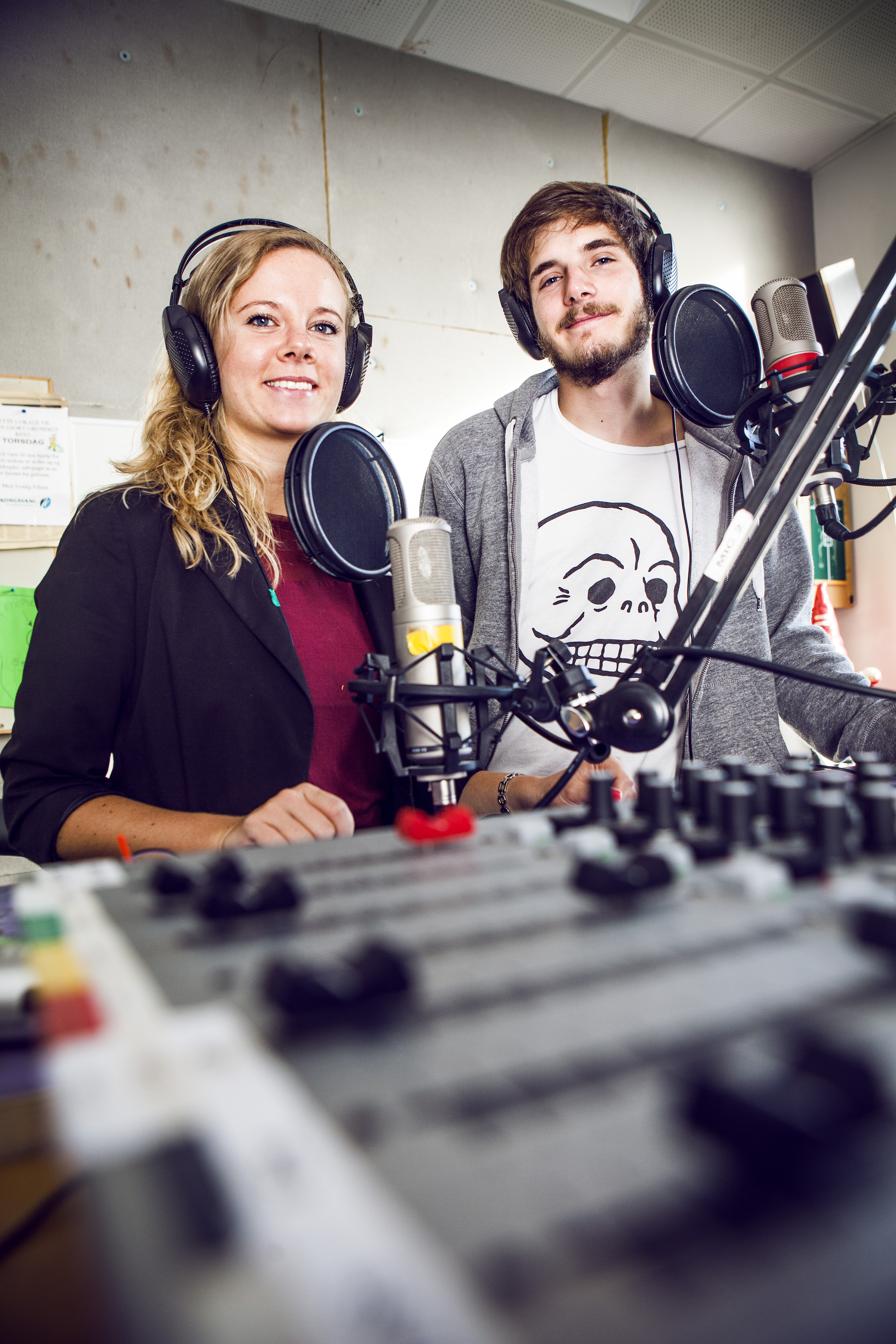Is there anybody out there?
A day in the life of “SU Live”. New ventures always experience a certain number of teething problems. And AU’s new radio programme “SU Live” is no exception to the rule. A series of technical hitches led to the postponement of the planned premiere of the programme, which aims to debunk some myths about AU degree programmes, review some Friday bars, and analyse the news on a weekly basis.



“1-2-3. Is it working?” The new radio hostess Marlene Kongsted and her co-host Emil Kristensen are doing one final sound test before the very first recording of a new programme called “SU Live” on the Aarhus Student Radio.
The two hosts are both third-semester students of media studies at AU. They started toying with the idea of producing a radio programme just before the summer holiday.
“Our degree programme is pretty theoretical, so this is a great chance to use some of our knowledge in practice,” says Emil.
“I’d like to do something similar when I finish my degree, so it’s great to be trying this kind of thing already, and I guess it’ll look good on my CV as well,” adds Marlene. She has always wanted to work with the media and journalism, focusing firmly on this goal ever since finishing high school.
No experience of radio
Even though the two students have been ploughing through a good deal of media theory during their degree programme, neither of them has any experience of actually producing radio programmes. They should have recorded the programme a week ago, but the recording equipment broke down. They discovered later. And this morning they are having problems with the sound socket, the music, and the recording equipment again. But they press on regardless, and have apparently overcome their technical difficulties.
“I’m ready when you are,” says Marlene. The earphones are on and the microphone is in position.
“Then let’s do it!” Emil plays the intro number, and when it fades out the two hosts present the programme.
“Hello. And welcome to SU Live. The programme which debunks myths about AU degree programmes and tells you what we think about Friday bars,” starts Marlene, after which Emil takes over:
“This time we’ll be telling you about our own Friday bar, so we are a bit biased. It’s pretty unforgivable I know, but we do have a great bar.”
Marlene interrupts:
“And we’re both on the media studies degree programme, so we’ll also be looking at the way our news is socially constructed.”
Friday evenings at 9-10 pm
Emil and Marlene developed the concept for the programme themselves. They presented the idea to the Aarhus Student Radio, who thanked them and allocated them a slot every Friday at 9-10 pm.
“We wanted to make a programme by students and for students, because we felt that our student radio lacked a programme focusing on life as a student,” explains Marlene.
In addition to a report on Friday bars and an analysis of current media issues, each programme gives students a tip which may be of some relevance to their studies. This time Emil and Marlene recommend that new students should pop into the City Hall to pick up a free welcome pack containing information and special student discounts. And they also invite a student into the studio each week and confront them with a range of prejudices. Today it’s a student of biology called Jens, who is met with a shower of prejudices and questions about what it’s like to study biology.
Do you spend a lot of time wandering around bogs and marshes? Do you take off your waders before going into town? What’s your favourite micro-organism? Are there plenty of excursions for students of biology? What’s your Friday bar like? How easy is it to score? Are there just as many men as women?
Jens also gets the chance to air his prejudices about next week’s guest – a student of education science.
“They’re a bit vague about what they do, so perhaps they don’t actually do very much? I look forward to hearing more about them.”
“Fantastic! So there’ll be at least one person listening next week!” exclaims Emil enthusiastically. But he quickly retracts the statement.
“Sorry – you’re not really supposed to say that sort of thing ...”
Not the best transmission slot
There’s no doubt about it. Both Marlene and Emil agree that Friday evening at 9-10 pm is not exactly the best transmission slot.
“That’s when people tend to be at a Friday bar,” says Marlene, explaining that they will be trying to create a programme with the kind of style and music that matches Friday evenings after a few beers.
“People can’t be bothered to listen to serious journalism at that sort of time,” says Emil, adding:
“We aren’t doing this to attract a lot of listeners and gain popularity. And I don’t expect this to make me famous. My main aim is to gain some practical experience – and I like working with the medium of radio,” he explains. But he does have a few modest ambitions.
“We care a good deal about the programme, and it would be great if people tuned in because they were interested in learning more about AU degree programmes.”
Take it as it comes
The two hosts will be planning and running the transmissions themselves on top of their full-time degrees.
“It actually takes a bit more of our time than we expected. We’ve just spent about six or seven hours planning a single programme that only takes one hour. But things will probably improve in time,” hopes Marlene.
Unlike Emil, she prepares all her words in advance. Emil improvises.
“It’s like: Take it as it comes, we’ll probably work out some sort of structure after a while.
It’s true that the loose, slightly unstructured approach influences the first programme.
“The idea is that it should sound a bit like a conversation,” says Marlene.
The dress rehearsal that went wrong
After just over an hour of recording, six pieces of music and a good deal of verbal ping-pong over the mauve-coloured radio desk, the two hosts can wrap up the first “SU Live” programme. All they have to do now is edit what they’ve recorded, ready for the premiere later the same evening. Marlene puts down her earphones with a satisfied smile and steps away from the microphone.
“That went OK.”
Emil is struggling with the radio recorder.
“Emil, I’m going to jump out of the window if that thing hasn’t been recording everything we’ve done,” says Marlene, staring at him and the recorder by turns.
“No, it’s all here,” replies Emil. A sense of relief spreads through the studio.
But a few hours later it turns out that the programme hasn’t been recorded after all.
“We couldn’t find the programme on the recorder. We’re afraid the ‘stop recording’ button means ‘delete recording’,” explains Marlene. But she decides not to jump out of the window.
The premiere has to be postponed for a week, so today’s session has to be regarded as an involuntary dress rehearsal. But you know what they say: a bad dress rehearsal means a good opening night.
SU Live
The programme is produced by two third-semester students of media studies: Marlene Kongsted and Emil Kristensen. It focuses on the life of students. Each week the hosts offer a tip that is related to student life, review a Friday bar, debunk myths about AU degree programmes, and analyse the news from the perspective of media studies.
SU Live is transmitted every Friday at 9-10 pm. The name is not strictly speaking correct, because the programme is produced in advance and is not actually live.
Aarhus Student Radio
The radio is run by a staff of student volunteers in and around Aarhus and from a broad range of degree programmes. The programmes are made primarily by students and for students, and there is a great deal of variety in the course of the week, with everything from early-morning radio to music programmes, answers to FAQs and even slightly sleazy radio programmes to tickle your fancy.
Everyone is welcome to produce programmes for the Student Radio. All you need is a good idea.
The radio first went on the air in 1996, and you can tune in at 98.7 FM or www.aasr.dk (in Danish)

